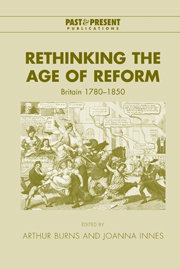Book contents
- Frontmatter
- Contents
- Notes on contributors
- Preface
- List of abbreviations
- 1 Introduction
- 2 ‘Reform’ in English public life: the fortunes of a word
- 3 Parliament, the state, and ‘Old Corruption’: conceptualizing reform, c. 1790–1832
- 4 ‘Old wine in new bottles’: the concept and practice of law reform, c. 1780–1830
- 5 English ‘church reform’ revisited, 1780–1840
- 6 Medicine in the age of reform
- 7 British antislavery reassessed
- 8 ‘The age of physiological reformers’: rethinking gender and domesticity in the age of reform
- 9 Reforming the aristocracy: opera and elite culture, 1780–1860
- 10 Reform on the London stage
- 11 Reforming culture: national art institutions in the age of reform
- 12 Irish reform between the 1798 Rebellion and the Great Famine
- 13 Empire and parliamentary reform: the 1832 Reform Act revisited
- 14 Reforms, movements for reform, and possibilities of reform: comparing Britain and continental Europe
- Index
- Past and Present Publications
9 - Reforming the aristocracy: opera and elite culture, 1780–1860
Published online by Cambridge University Press: 15 December 2009
- Frontmatter
- Contents
- Notes on contributors
- Preface
- List of abbreviations
- 1 Introduction
- 2 ‘Reform’ in English public life: the fortunes of a word
- 3 Parliament, the state, and ‘Old Corruption’: conceptualizing reform, c. 1790–1832
- 4 ‘Old wine in new bottles’: the concept and practice of law reform, c. 1780–1830
- 5 English ‘church reform’ revisited, 1780–1840
- 6 Medicine in the age of reform
- 7 British antislavery reassessed
- 8 ‘The age of physiological reformers’: rethinking gender and domesticity in the age of reform
- 9 Reforming the aristocracy: opera and elite culture, 1780–1860
- 10 Reform on the London stage
- 11 Reforming culture: national art institutions in the age of reform
- 12 Irish reform between the 1798 Rebellion and the Great Famine
- 13 Empire and parliamentary reform: the 1832 Reform Act revisited
- 14 Reforms, movements for reform, and possibilities of reform: comparing Britain and continental Europe
- Index
- Past and Present Publications
Summary
During the debates over the Reform Act in 1832, the concept of ‘reform’ was applied not only to parliament, but also to another bastion of elite influence: the King's Theatre, London's only Italian opera house. In February 1832, the Court Journal expressed its regret that ‘no “spirited individual”’ had undertaken ‘a radical reform in that most “corrupt” of houses – the Italian Opera house’. That same month, Thomas McLean issued a print depicting the debates over the Reform Bill as ‘A New Serio-Comic Opera’ performed by leading figures from across the political spectrum (Plate 2). Whether the language of politics was used to interpret operatic affairs, or whether opera became a means of expressing divergent political views, both sources linked the opera to the politics of electoral reform. Was there any substance to such a relationship, or were these merely effective rhetorical flourishes reminding the public that the fate of the Reform Act then rested in the hands of the House of Lords, whose members often whiled away their time at the opera and who showed little interest in passing the bill?
By examining the opera within its historical context, this chapter will attempt to tease out the elusive answers to this question. It will argue that calls for electoral reform are best understood as part of a broad, but diffuse, assault on the power of the aristocracy in politics, society, and culture.
- Type
- Chapter
- Information
- Rethinking the Age of ReformBritain 1780–1850, pp. 220 - 237Publisher: Cambridge University PressPrint publication year: 2003
- 3
- Cited by



